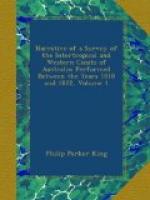Sketch 2: Islands off admiralty
gulf, looking southward from the
north-east
end of cassini island.
Left to right: Peak upon Cape Voltaire and Condillac
Island,
bearing South, two miles
distant.
Several drawings of Captain King.
Sketch 3: Two conspicuous hills
north-east of Prince-regent’s
river.
Left to right: Mount Trafalgar and Mount Waterloo.
Map of the chains of islands
on the north-west coast of
carpentaria:
In English Miles.
A. Castlereagh Bay.
B. Point Dale.
C. Arnhem Bay.
D. Melville Bay.
E. Cape Arnhem.
F. Caledon Bay.
1, 1 etc. Wessel’s Islands.
2, 2 etc. The English Company’s Islands.
3. Red Cliffs.
4. Mallison’s Island.
5. Cape Newbold.
6. Cape Wilberforce.
7. Bromby’s Islands.
Sketch 4: Cliff of considerable
height, in which the beds,
though
inaccessible at
the top, may be examined with
ease and security,
where they
come down to the shore.
Sketch 5: Hammer for collecting geological specimens.
Sketch 6: Small hammer for trimming geological specimens.
Sketch 7: Small stone-cutter’s chisel.
Plates at the end of the volume, referred to in the appendix.
Table A.
Chlamydosaurus kingii.
The plate was engraved by Mr. Curtis, from an exceedingly
correct
drawing made by Henry
C. Field, Esquire. Fel. Coll. Surg.
Published by John Murray, Albemarle Street, March,
1826.
Table B.
Carpophagus banksiae.
Megamerus kingii.
Phasma tiaratum.
Drawn by Miss M.L. Field. J. Curtis sculp.
Published by John Murray, Albemarle Street, March,
1826.
Table C.
Kingia Australis.
Curtis, Id et sculp.
Published by John Murray, Albemarle Street.
...
VOYAGES FOR THE SURVEY OF THE INTERTROPICAL COASTS OF AUSTRALIA.
Chapter 1.
Survey upon the mermaid.
Purchase another vessel.
New establishment.
Departure on the fourth voyage, accompanied by a merchant-ship
bound through Torres
Strait.
Discovery of an addition to the crew.
Pass round Breaksea Spit, and steer up the East Coast.




